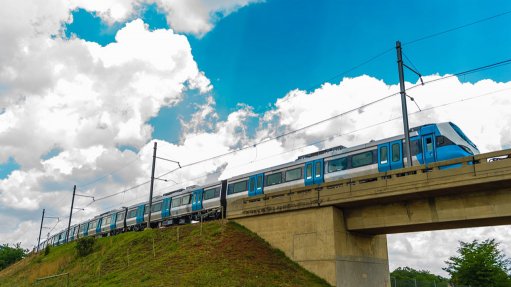
The Passenger Rail Agency of South Africa (PRASA), along with the Gibela Rail Transportation Consortium, on Monday began open line testing on the first test train (TT1) imported from Brazil.
Testing took place between Wolmerton and De-Wildt in Pretoria and would be completed by the end of September in anticipation of commercial operation in October.
Speaking to Engineering News Online, PRASA spokesperson Victor Dlamini noted that the acquisition of the new X’Trapolis Mega commuter trains was part of PRASA’s Modernisation Programme, which included the upgrading of key rail infrastructure over the next 20 years to enable the roll-out of new rolling stock throughout key operational corridors.
He pointed out that R172-billion had been set aside for the programme.
Open line testing of the new passenger trains was focused on speed testing, passenger comfort, braking and acceleration and the handling of corners.
“Two trains have already been delivered from Brazil, while the remainder will arrive in the country by the end of the year. The first batch of trains will be running by October,” he said.
In 2014, PRASA and Gibela reached financial close for the manufacture of 600 new trains at a cost of R59-billion.
Gibela would manufacture 580 trains in South Africa and 20 trains in Brazil, with the contract subject to a 65% localisation target.
Gibela recently started construction of its R1-billion local manufacturing plant, in Dunnottar, Ekurhuleni.
The plant would also include a supplier park, which would house direct suppliers to Gibela.
R800-million had been set aside for skills development with 1 500 people to be permanently employed at the plant.
A further 19 500 people would receive rail-related training at the on-site training centre, while 36 train drivers were being trained to support the first deployment of the new trains for commercial operation.
“To date, six of 15 test drivers have been trained and certified,” Dlamini noted, adding that PRASA would gradually introduce new operating corridors in Pretoria.
He pointed out that a new operating system would also be introduced to accommodate the new trains.
With years of underinvestment in passenger rail infrastructure, PRASA had to focus on isolating a test and deployment area for the new trains that would not require intensive rehabilitation before the new trains could be deployed, said acting PRASA CEO Nathi Khena.
“Ultimately, the Pienaarspoort to Pretoria line was deemed the most appropriate corridor to deploy the first trains,” he said.